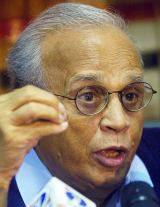Dope on the doping scandal
Cricinfo summarises the key observations made by the committee, translated from legalese into something you may comprehend
Cricinfo staff
05-Dec-2006
|
|

|
The appellate committee's decision to overturn the bans on Shoaib Akhtar and Mohammad Asif may have surprised many. So why were the original findings overturned? The original report takes over 30 pages to explain the reasons behind their decision. Cricinfo summarises the key observations made by the committee, translated from legalese into something you may comprehend.
Whose rules are they anyway?
The problem with whose rules were being applied to adjudicate the cases existed from the very beginning: were the players tried and punished under the PCB's doping policy or the ICC and WADA's doping codes?
As the tests conducted were internally done, and out of competition, the cases should have been handled - and punishments meted out - under the aegis of the PCB's relevant codes. The appeals committee, however, concluded that though the players were charged under the PCB's codes, the punishments handed to them and the benchmarks on which those punishments were decided, were based on the ICC's codes.
In particular, the problem existed over the definition of 'exceptional circumstances' on which the bans were eventually overturned. The PCB and the ICC and WADA define these in significantly different ways.
This discrepancy, the report says, led to the first committee's findings being "fatally plagued." They were found to be guilty initially on the ICC/WADA definition but not guilty on those of the PCB's during their appeals.
Science says?
The players' lawyers also argued that scientific evidence surrounding Nandrolone suggested it could be produced endogenously (internally by the body). The committee argued that there was as much evidence to refute this as to support it and so they were not "persuaded by the defence that Shoaib Akhtar's positive test was caused due to endogenous production on account of his diet and exercise regime."
But the committee did acknowledge that there existed cases globally which showed that nutritional supplements were contaminated with banned substances. Citing several cases, including that of Greg Rusedski, the tennis player, the committee found "sufficient material has been brought before this committee to conclude that nutritional supplements used by Shoaib and Asif, which we may add are well-known branded supplements readily available in the open market, could have contained an undeclared prohibited substance that resulted in their positive test."
And while we're at it, let's not forget...
The committee makes it abundantly clear that neither Shoaib nor Asif were ever warned or cautioned against taking supplements by the PCB, whose responsibility it was to do so. "The vast record of proceedings establishes that the players were never advised against taking supplements, nor were they even provided with any local or international publications warning them against the use of supplements."
The PCB's own regulations say nothing of supplements, notes the report. The board's anti-doping officer, Dr Sohail Saleem, told the committee that no players were advised on anti-doping regulations in the past year. The doctor also admitted that he could not say if the players were told about the use of supplements not on the prohibited list.
A WADA booklet, with a detailed warning on supplement use, was given to the team physio, Darryn Lifsun before the tour to England to hand out to players, but he said he could not recall whether Shoaib or Asif took their copies. Lifsun also said that the use of dietary supplements was part of trainer Murray Stevenson's responsibilities. Stevenson said they weren't.
I object, m'lord
An 11-page note of dissent was also included in the report, from the third member of the tribunal, Dr Danish Zaheer. In a nutshell, his objection lies with the flaws in the testing procedures carried out by the PCB. He argues, on that basis, that the whole process should be repeated, new samples provided and fresh verdicts given. But he also strongly disputes whether or not the players were able to comprehensively prove the 'exceptional circumstances' that led to the bans being overturned.